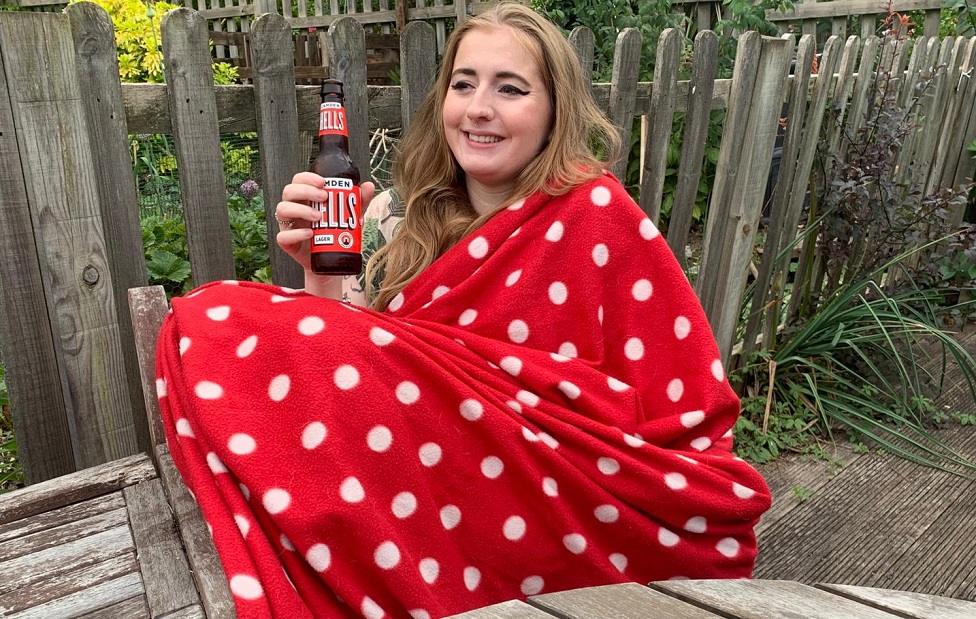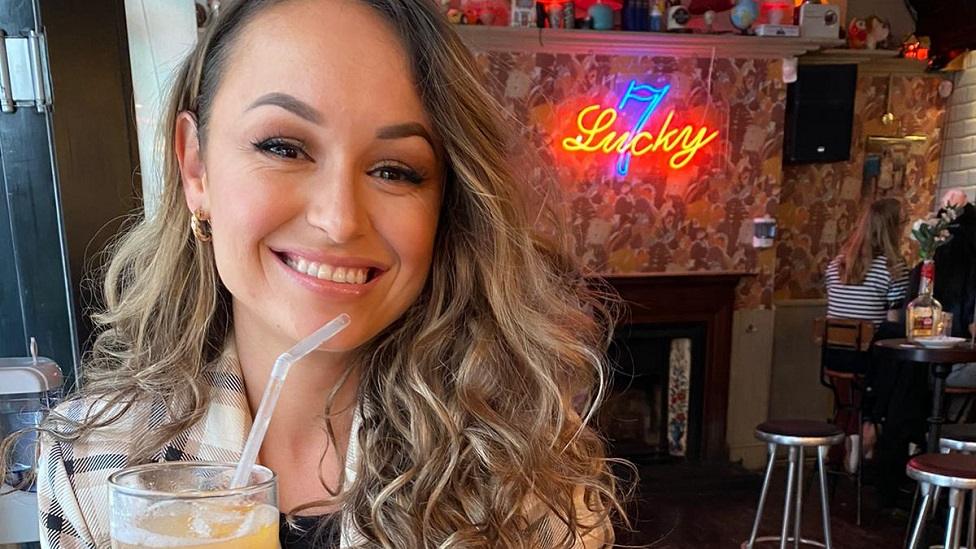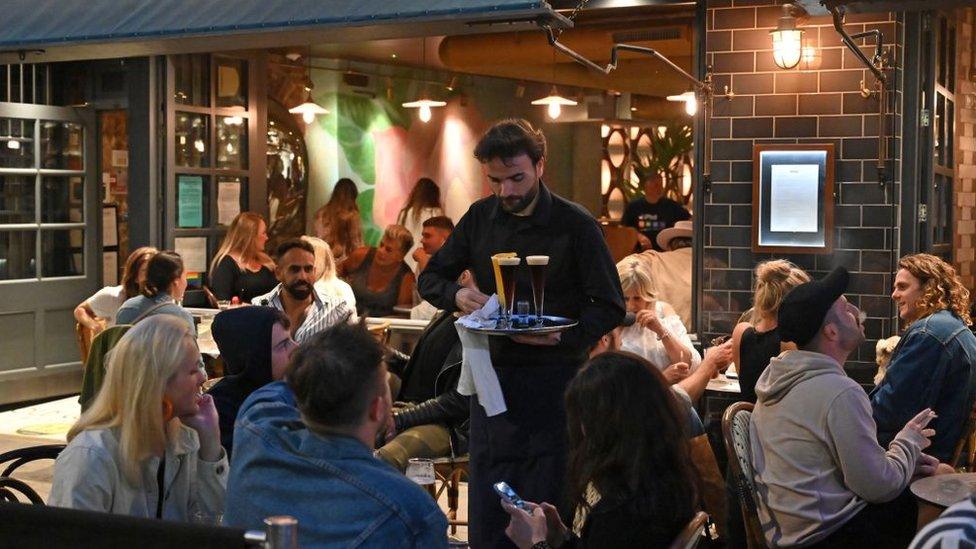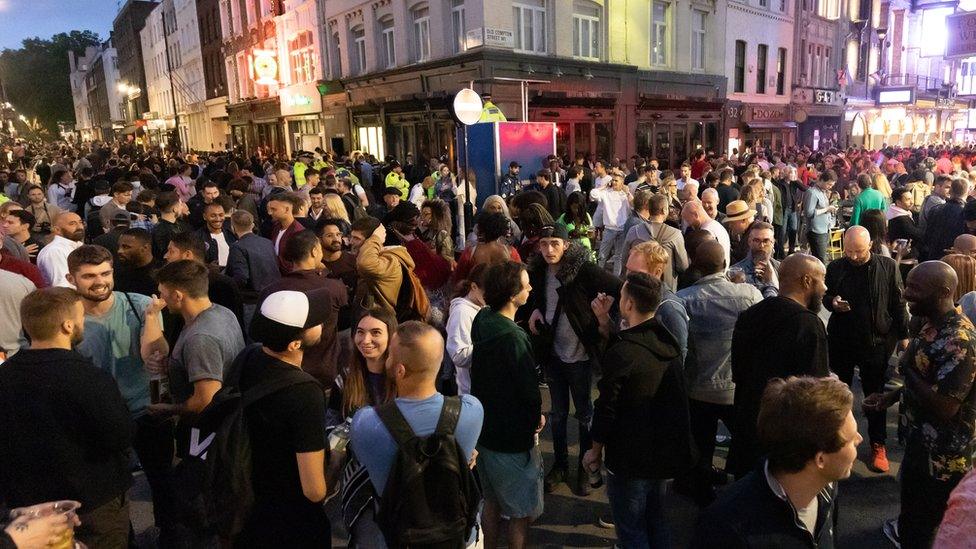Coronavirus shielders: 'We're a bit forgotten'
- Published
Large crowds of people visited London's Soho district to celebrate pubs reopening
The weekend was an exciting milestone for many people in England, as pubs and bars opened their doors for the first time in months.
But for some, groups of friends catching up over drinks and filling the streets late into the night made for scary scenes.
Eliza marked so-called "Super Saturday" with a takeaway and beers in her garden.
She has been staying at home during lockdown because she lives with a number of health conditions and says seeing photos of crowded pubs and streets makes her feel unsafe.
"I think everybody should be allowed to make the decisions that they want to make," the 23-year-old tells Newsbeat.
"But it did kind of make me and my partner feel like we're a little bit forgotten because we can't go into situations like that."

Eliza preferred to enjoy a beer in her garden
Eliza's partner Michael has type 1 diabetes, which studies suggest puts him more at risk.
Eliza doesn't have to shield, but her nurse has told her to avoid transport and busy public spaces and to only meet friends outside.
Allow X content?
This article contains content provided by X. We ask for your permission before anything is loaded, as they may be using cookies and other technologies. You may want to read X’s cookie policy, external and privacy policy, external before accepting. To view this content choose ‘accept and continue’.

Strict safety practices were in place as pubs and restaurants opened up and police have said most people adhered to social distancing guidelines.
But some pictures of busy streets - including in Soho in London - showed that not everyone was following the "one metre plus" instructions.
"It does make me feel unsafe," says Eliza.
"If you've got into a pub and you've been respectful and you know you haven't hung outside really close to people, then that's completely fine.
"It's just that a small minority can really impact a large amount of people.
"It's kind of just like, they don't really care at this point, and they're just bored and I think people's fear is definitely gone down now."
For Eliza, another spike in coronavirus cases prolongs the amount of time she has to stay inside under the advice of her nurse.
Allow X content?
This article contains content provided by X. We ask for your permission before anything is loaded, as they may be using cookies and other technologies. You may want to read X’s cookie policy, external and privacy policy, external before accepting. To view this content choose ‘accept and continue’.
She says it can feel like pub-goers "think that disabled people should just stay inside and look after themselves - when I think it needs to be a community effort".
She did go out to an electrical shop at the weekend to return something she'd bought online. But she won't do it again in a hurry.
"It was kind of stressful," she says.
"They weren't limiting the number of people going in.
"None of them had face coverings and I think I was the only one who did."
What does ‘one metre plus’ mean?
Millie, 15, lives in Caerphilly in Wales and says she "wasn't quite prepared" for seeing some of the pictures of packed streets.
Wales has stricter lockdown measures than the rest of the UK, and pubs can only serve takeaways.
Millie has Cystic Fibrosis and has been shielding since before lockdown officially started in March.
"I was quite shocked to be honest," she says about the photos she saw from England.
Millie's been seeing photos of her friends meeting with each other outside at a distance, but won't be coming out of shielding until mid-August at the earliest.
She says she's not desperate to get out in big groups - she just wants to spend some quality time with her closest mates.
"I feel like people are kind of brushing it off as if it's ended, but it hasn't."
Allow X content?
This article contains content provided by X. We ask for your permission before anything is loaded, as they may be using cookies and other technologies. You may want to read X’s cookie policy, external and privacy policy, external before accepting. To view this content choose ‘accept and continue’.

BBC reporter Alex Taylor is shielding and as much as he would like to be back in the pub or at a bar, he can't do it safely right now.
"The virus hasn't gone away," he tells Radio 1 Newsbeat.
"Initially I found lockdown less difficult than many others because, as a disabled person, you often get used to having your autonomy restricted and work to push the confines of your independence as much as possible.
"The scenes this weekend didn't surprise me, but made me realise that many people are just looking out for themselves.
"The virus is invisible, and lockdown has been a struggle for many who have never had their freedoms restricted, let alone think of others in this way."


SOCIAL DISTANCING: What are the rules now?
40,000 DEATHS: Could they have been prevented?
FACE MASKS: When should you wear one?
LOOK-UP TOOL: How many cases in your area?
TWO METRES: Could less than 2m work?

- Published5 July 2020

- Published5 July 2020

- Published5 July 2020
